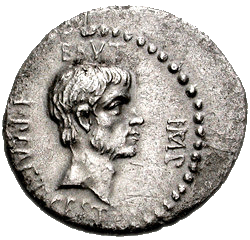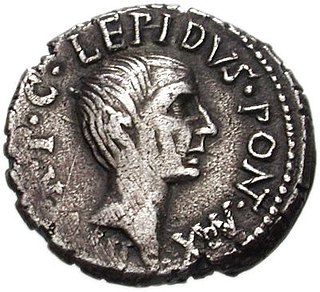Related Research Articles

Marcus Antonius, commonly known in English as Mark Antony, was a Roman politician and general who played a critical role in the transformation of the Roman Republic from a constitutional republic into the autocratic Roman Empire.
Year 43 BC was either a common year starting on Sunday, Monday or Tuesday or a leap year starting on Sunday or Monday of the Julian calendar and a common year starting on Monday of the Proleptic Julian calendar. At the time, it was known as the Year of the Consulship of Pansa and Hirtius. The denomination 43 BC for this year has been used since the early medieval period, when the Anno Domini calendar era became the prevalent method in Europe for naming years.

This article concerns the period 49 BC – 40 BC.

Marcus Junius Brutus was a Roman politician, orator, and the most famous of the assassins of Julius Caesar. After being adopted by a relative, he used the name Quintus Servilius Caepio Brutus, which was retained as his legal name. He is often referred to simply as Brutus.

Marcus Aemilius Lepidus was a Roman general and statesman who formed the Second Triumvirate alongside Octavian and Mark Antony during the final years of the Roman Republic. Lepidus had previously been a close ally of Julius Caesar. He was also the last pontifex maximus before the Roman Empire, and (presumably) the last interrex and magister equitum to hold military command.
Publius Cornelius Dolabella was a Roman politician and general under the dictator Julius Caesar. He was by far the most important of the patrician Cornelii Dolabellae but he arranged for himself to be adopted into the plebeian Cornelii Lentuli so that he could become a plebeian tribune. He married Cicero's daughter, Tullia, although he frequently engaged in extramarital affairs. Throughout his life he was an extreme profligate, something that Plutarch wrote reflected ill upon his patron Julius Caesar.
Servilia was a Roman matron from a distinguished family, the Servilii Caepiones. She was the daughter of Quintus Servilius Caepio and Livia, thus the half-sister of Cato the Younger. She married Marcus Junius Brutus, with whom she had a son, the Brutus who, along with others in the Senate, would assassinate Julius Caesar. After her first husband's death in 77, she married Decimus Junius Silanus, and with him had a son and three daughters.

Lucius Antonius was the younger brother and supporter of Mark Antony, a Roman politician. He was nicknamed Pietas as a young man.
Gaius Trebonius was a military commander and politician of the late Roman Republic, who became suffect consul in 45 BC. He was an associate of Julius Caesar, having served as his legate and having fought on his side during the civil war, and was among the tyrannicides who killed the dictator.
Marcus Aemilius Lepidus the Younger or Marcus Aemilius Lepidus Minor was a son of triumvir Marcus Aemilius Lepidus and his wife Junia Secunda, a half-sister of Caesar's assassin Brutus.
Marcus Livius Drusus Claudianus was a senator and praetor of the Roman Republic. He was born with the name Appius Claudius Pulcher, into the patrician family of the Claudii Pulchri but adopted by a Livii Drusi as a small child. His daughter Livia Drusilla became the wife of the first Roman Emperor Augustus, and he was a direct ancestor of the Julio-Claudian emperors Tiberius, Caligula, Claudius and Nero.
Publius Servilius Vatia Isauricus, was a politician and general of the Roman Republic and a member of the plebeian branch of the gens Servilii. He was elected consul for 79 BC with Appius Claudius Pulcher as his consular collegae. From 78 to 74 BC, as proconsul of Cilicia, he fought against the Cilician Pirates and Isaurian hill tribes in Asia Minor. He was granted the agnomen Isauricus for his victories over the Isaurians. Upon returning to Rome he celebrated a triumph for his victories.
Lucius Julius Caesar was a Roman politician and senator who was elected consul of the Roman Republic in 64 BC. A supporter of his cousin, the Roman dictator Gaius Julius Caesar, Lucius was a key member of the senatorial coalition which strove to avoid civil war between the Roman Senate and his nephew Marcus Antonius in the aftermath of Caesar's assassination in 44 BC.

Claudia was the daughter of Fulvia by her first husband Publius Clodius Pulcher. She was the stepdaughter of Mark Antony and half-sister of his sons Marcus Antonius Antyllus and Iullus Antonius.
Antonia was a Roman noblewoman who married the Greek nobleman Pythodoros of Tralles. She has been identified as the daughter of the general Mark Antony, presumably by his second wife Antonia Hybrida Minor. Theodor Mommsen was the first historian to identify Pythodoros' wife as the same woman as the daughter of Antony who was engaged to a son of the triumvir Lepidus. Mommsen's view has found wide acceptance but is not without its detractors.

The Philippics are a series of 14 speeches composed by Cicero in 44 and 43 BC, condemning Mark Antony. Cicero likened these speeches to those of Demosthenes against Philip II of Macedon; both Demosthenes’ and Cicero's speeches became known as Philippics. Cicero's Second Philippic is styled after Demosthenes' De Corona.
The gens Servilia was a patrician family at ancient Rome. The gens was celebrated during the early ages of the Republic, and the names of few gentes appear more frequently at this period in the consular Fasti. It continued to produce men of influence in the state down to the latest times of the Republic, and even in the imperial period. The first member of the gens who obtained the consulship was Publius Servilius Priscus Structus in 495 BC, and the last of the name who appears in the consular Fasti is Quintus Servilius Silanus, in AD 189, thus occupying a prominent position in the Roman state for nearly seven hundred years.

Servilia was an ancient Roman woman who was the wife of Marcus Aemilius Lepidus Minor, the son of the triumvir and Pontifex maximus Lepidus. She may also have been the same Servilia who was at one time engaged to Octavian.
References
- ↑ Broughton, Magistrates of the Roman Republic 2, p. 619
- ↑ RE Servilius 67, col. 1799
- ↑ Oxford Classical Dictionary, Servilius Isauricus, Publius
- ↑ Marjorie Lightman, Benjamin Lightman; A to Z of Ancient Greek and Roman Women - page: 176
- ↑ Susan Treggiari; Servilia and her Family - page: 7
- ↑ Weigel, Richard D, Lepidus: The Tarnished Triumvir, Routledge, New York, 1992, p.96/
- ↑ Treggiari, Susan (2019-01-03). Servilia and her Family. Oxford University Press. p. 133. ISBN 978-0-19-256465-8.